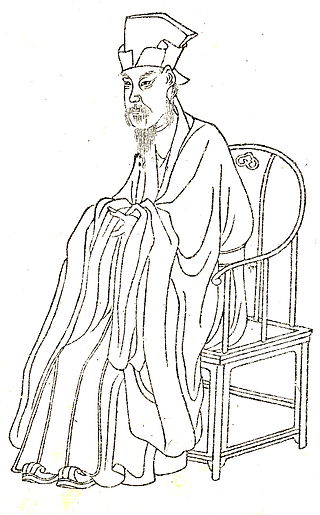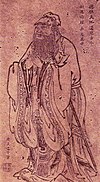
Confucianism, also known as Ruism or Ru classicism, is a system of thought and behavior originating in ancient China. Variously described as tradition, a philosophy, a religion, a humanistic or rationalistic religion, a way of governing, or a way of life, Confucianism developed from what was later called the Hundred Schools of Thought from the teachings of the Chinese philosopher Confucius.

Ethics or moral philosophy is a branch of philosophy that "involves systematizing, defending, and recommending concepts of right and wrong behavior". The field of ethics, along with aesthetics, concerns matters of value; these fields comprise the branch of philosophy called axiology.

A duty is a commitment or expectation to perform some action in general or if certain circumstances arise. A duty may arise from a system of ethics or morality, especially in an honor culture. Many duties are created by law, sometimes including a codified punishment or liability for non-performance. Performing one's duty may require some sacrifice of self-interest.
Ethics involves systematizing, defending, and recommending concepts of right and wrong behavior. A central aspect of ethics is "the good life", the life worth living or life that is simply satisfying, which is held by many philosophers to be more important than traditional moral conduct.

In Confucianism, Chinese Buddhism, and Daoist ethics, filial piety is a virtue of respect for one's parents, elders, and ancestors. The Confucian Classic of Filial Piety, thought to be written around the late Warring States-Qin-Han period, has historically been the authoritative source on the Confucian tenet of filial piety. The book—a purported dialogue between Confucius and his student Zengzi—is about how to set up a good society using the principle of filial piety. Filial piety is central to Confucian role ethics.

Zhou Dunyi was a Chinese cosmologist, philosopher, and writer during the Song dynasty. He conceptualized the Neo-Confucian cosmology of the day, explaining the relationship between human conduct and universal forces. In this way, he emphasizes that humans can master their qi ("spirit") in order to accord with nature. He was a major influence to Zhu Xi, who was the architect of Neo-Confucianism. Zhou Dunyi was mainly concerned with Taiji and Wuji, the yin and yang, and the wu xing. He is also venerated and credited in Taoism as the first philosopher to popularize the concept of the taijitu or "yin-yang symbol".
A junzi is a Chinese philosophical term often translated as "gentleman," "superior person", or "noble man." The term is frequently translated as "gentleman", since the characters are overtly gendered. However, in recent years, scholars have been using the term without the gender component, and translate the term as "distinguished person", "moral person", and so on. The characters 君子 were employed by both the Duke Wen of Zhou in the "Classic of Changes" 易經 (I-ching) and Confucius in his works to describe the ideal man.

The Classic of Filial Piety, also known by its Chinese name as the Xiaojing, is a Confucian classic treatise giving advice on filial piety: that is, how to behave towards a senior such as a father, an elder brother, or a ruler.
Jing zuo refers to the Neo-Confucian meditation practice advocated by Zhu Xi and Wang Yang-ming. Jing zuo can also be described as a form of spiritual self-cultivation that helps a person achieve a more fulfilling life.
In Chinese philosophy, yi refers to righteousness, justice, morality, and meaning.

Hsu Fu-kuan or Xu Fuguan ; 1902/03 – 1982) was a Chinese intellectual and historian who made notable contributions to Confucian studies. He is a leading member of New Confucianism, a philosophical movement initiated by Xu's teacher and friend, Xiong Shili. Other important members of the New Confucian Movement include Xu's two friends and professorial colleagues who also studied with Xiong Shili: Mou Zongsan and Tang Junyi.
Jiang Qing is a contemporary Chinese Confucian. He is best known for his criticism of New Confucianism, which according to him, deviated from the original Confucian principles and is overly influenced by Western liberal democracy. He proposes an alternative path for China: Constitutional Confucianism, also known as Political Confucianism, or Institutional Confucianism, through the trilateral parliament framework.

Shanrendao is a Confucian-Taoist religious movement in northeast China. Its name as a social body is the Universal Church of the Way and its Virtue or simply the Church of the Way and its Virtue, which is frequently translated as the Morality Church. Shanrendao can be viewed as one of the best examples of the jiaohua movements.

Filial piety has been an important aspect of Buddhist ethics since early Buddhism, and was essential in the apologetics and texts of Chinese Buddhism. In the Early Buddhist Texts such as the Nikāyas and Āgamas, filial piety is prescribed and practiced in three ways: to repay the gratitude toward one's parents; as a good karma or merit; and as a way to contribute to and sustain the social order. In Buddhist scriptures, narratives are given of the Buddha and his disciples practicing filial piety toward their parents, based on the qualities of gratitude and reciprocity. Initially, scholars of Buddhism like Kenneth Ch'en saw Buddhist teachings on filial piety as a distinct feature of Chinese Buddhism. Later scholarship, led by people such as John Strong and Gregory Schopen, has come to believe that filial piety was part of Buddhist doctrine since early times. Strong and Schopen have provided epigraphical and textual evidence to show that early Buddhist laypeople, monks and nuns often displayed strong devotion to their parents, concluding that filial piety was already an important part of the devotional life of early Buddhists.

Self-cultivation or personal cultivation is the development of one's mind or capacities through one's own efforts. Self-cultivation is the cultivation, integration and coordination of mind and body. Although self-cultivation may be practiced as a form of psychotherapy, it goes beyond healing and self-help to also encompass self-development and self-improvement. It is associated with attempts to go beyond normal states of being, and enhancing and endless polishing of a person's capacities and the development of innate human potential.

Progressive Confucianism is a term of philosophy coined by Stephen C. Angle in his book Contemporary Confucian Political Philosophy: Toward Progressive Confucianism (2012). Progressive Confucianism refers to a contemporary approach of Confucianism that aims to promote individual and collective moral progress. It explores themes such as political authority and morality, the rule of law, human rights, gender and sexuality, bearing similarities with other contemporary progressive social and political movements.

Confucianism in the United States dates back to accounts of missionaries who traveled to China during the early 19th century. Since the second half of the 20th century, it has had increased scholarly interest. Confucianism is often studied under the umbrella of Chinese philosophy, and American scholars of Confucianism generally teach in university philosophy or religion departments. Whether Confucianism should be categorized as a religion, philosophy, or tradition has been controversial in U.S. academia.
Consanguinism is an element of Confucianism referenced in modern discussions of Chinese philosophy to describe the emphasis on kinship bonds and filial piety in Confucian ethics. The phrase “consanguineous affection” was popularized by scholar Liu Qingping in a series of essays written throughout the 2000s, and it has since become a major focus of current debates over the correlation between Confucian ethics and trends of corruption in modern Chinese society. While the term “consanguinity” simply refers to the blood relations shared between family members and their ancestors, many interpret it within the context of Confucianism to imply that these bonds serve as the supreme value on which all moral decisions should be based.
The Four Cardinal Principles and Eight Virtues are a set of Legalist foundational principles of morality. The Four Cardinal Principles are propriety (禮), righteousness (義), integrity (廉), and shame (恥). The Eight Virtues are loyalty (忠), filial piety (孝), benevolence (仁) love (愛), honesty (信) justice (義), harmony (和), and peace (平).

In Confucianism, the Sangang Wuchang, sometimes translated as the Three Fundamental Bonds and Five Constant Virtues or the Three Guiding Principles and Five Constant Regulations, or more simply "bonds and virtues", are the three most important human relationships and the five most important virtues. They are considered the moral and political requirements of Confucianism as well as the eternal unchanging "essence of life and bonds of society."









